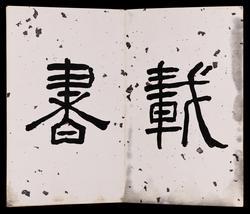Advanced Search 
臨黃秋𥂝載書圖 (翁同龢)
Here Weng Tonghe copied a painting titled Transporting Books, by the famous 18th-century seal carver and ancient calligraphy enthusiast, Huang Yi (1744–1802), depicting a friend moving to a new home. In 1790, this friend—a passionate book lover who spent all his money buying books—left Beijing for a new government post. As he traveled, numerous carriages followed behind piled high with his books.
Weng Tonghe must have had a similar experience when he departed Beijing. On June 15, 1898, due to political conflicts, the emperor suddenly ordered Weng to retire and return to his hometown. Preparing for this more-than-700-mile journey, Weng started to pack his family collection, including paintings, calligraphies, rare books, rubbings, and miscellaneous literati objects. A manuscript of his packing list reveals that he filled the first box with some of his most favored objects. The list includes three of the paintings in this gallery.

View: Spread
Thumbnail-size images of copyrighted artworks are displayed under fair use, in accordance with guidelines recommended by the Code of Best Practices in Fair Use for the Visual Arts, published by the College Art Association in February 2015.
After Huang Yi’s Transporting Books
臨黃秋𥂝載書圖 (翁同龢)
Weng Tonghe (Chinese, 1830–1904)
Chinese
Qing dynasty
1644–1912
Medium/Technique
ink and color on paper
Dimensions
Overall: 2.6 × 13.5 × 22.6 cm (1 × 5 5/16 × 8 7/8 in.)
Image: 22.5 × 26.8 cm (8 7/8 × 10 9/16 in.)
Image: 22.5 × 26.8 cm (8 7/8 × 10 9/16 in.)
Credit Line
Gift of the Wan-go H. C. Weng Collection in honor of Weng Tonghe
Accession Number2019.1996
NOT ON VIEW
CollectionsAsia
ClassificationsPaintings
Here Weng Tonghe copied a painting titled Transporting Books, by the famous 18th-century seal carver and ancient calligraphy enthusiast, Huang Yi (1744–1802), depicting a friend moving to a new home. In 1790, this friend—a passionate book lover who spent all his money buying books—left Beijing for a new government post. As he traveled, numerous carriages followed behind piled high with his books.
Weng Tonghe must have had a similar experience when he departed Beijing. On June 15, 1898, due to political conflicts, the emperor suddenly ordered Weng to retire and return to his hometown. Preparing for this more-than-700-mile journey, Weng started to pack his family collection, including paintings, calligraphies, rare books, rubbings, and miscellaneous literati objects. A manuscript of his packing list reveals that he filled the first box with some of his most favored objects. The list includes three of the paintings in this gallery.
Provenance19th century, Weng Tonghe (b. 1830 – d. 1904), Changshu, China; 1904, by inheritance from Weng Tonghe to his great-grandson, Weng Zhilian (d. 1919), Changshu and Tianjin; 1919, by inheritance from Weng Zhilian to his son, Wan-go H.C. Weng, Tianjin, New York, and New Hampshire; 2002, transferred to the Hsing Ching Weng Trust, New Hampshire; 2019, gift of the Hsing Ching Weng Trust to the MFA. (Accession Date: December 11, 2019)
